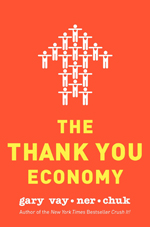Shower me with courtesy when I enter your store – even if I’m just buying a magazine and a stick of gum – and I might come back again. And I might mention your store to my friends, colleagues and associates who might end up shopping there, too, and telling their friends and colleagues about it. It’s a scenario that could ultimately lead to real prosperity over the course of time, even in today’s hardscrabble economic environment.

While “the customer is king” concept is hardly new – our parents and grandparents employed it decades ago, and every business advice guru worth his salt, from Dale Carnegie to Stephen Covey to Seth Godin and many others, has suggested his own version of it – a thoughtful new book makes the idea urgent all over again. In The Thank You Economy entrepreneur Gary Vaynerchuk applies the philosophy to businesses of all kinds – large, small, start up and web only. “The customer you should be scared of is the one who has a bad experience, who doesn’t say a word and never returns,” explains Vaynerchuk in his book. “You have no idea how to get the person back. You might not even realize you’ve lost him.” He adds, “The person who says on Twitter, ‘I bleeping hate you!’ is an awesome customer to have. If you can give alienated customers what they want, they will come back to you stronger than ever.” In the Internet age, he argues, it’s far cheaper to “cater to customers” than before.
Real World Advice for Real Businesses
Vaynerchuk, 35, is a native of Belarus who came to this country as a child. He helped transform his father’s brick-and-mortar liquor store in New Jersey into a national success by rebranding it as WineLibrary.com in 1997, at a time “when nobody thought local liquor stores belonged online,” he says.

He’s been described by BusinessWeek as someone who has “built a small empire on his own obsession with wine, the Internet, and business,” partly because he took the best face-to-face business practices from the physical store into the online environment, capitalizing on what he calls a ‘massive cultural shift.’” Today, he’s presiding over a $60 million venture and writing books in his spare time.
Here, from The Thank You Economy, are five tips for business people and entrepreneurs, no matter what the nature of the enterprise:
1. Think like a small-town shop owner, and take the long view. Do your damnedest to shape the word of mouth that circulates about you by treating each customer as though he or she were the most important customer in the world.
2. Be a pro at all times, and demand that everyone you hire or work with try to be one, too. All your employees should have as much caring in their DNA as you do.
3. Do not underestimate the sharpness of people’s BS radar. They can spot a soulless, bureaucratic tactic a million miles away. BS is a big reason why so many companies that have dipped a toe in social media waters have failed miserably there.
4. Try not to calculate that one customer is worth more than another, even as you recognize that a big customer can bring a lot to the table. How can you ever know who a potentially big customer is, anyway? Maybe a customer spends only a few hundred dollars with you a year. What you can’t see is that the customer is spending a few thousand elsewhere, maybe with your competitor.
5. Be willing to embark on a cultural overhaul. Are you skeptical that a large business or a strictly online business can form the same kind of friendly, loyal relationship with customers as a local retailer? It’s been done: I built my online company the same way I built the brick-and-mortar store. But it works only if everybody at the company gets on board. Every employee should be comfortable engaging in customer service and doing so authentically. The engagement has to be heartfelt – or it won’t work.
(From The Thank You Economy, © 2011 by Gary Vaynerchuk, used by permission of HarperCollins Publishers.)
Related Links:
Banks Face Up to a Personal Touch (The Financial Times):
Market Trend: Manufacturers Offer More Choices To Meet Demands of Do-It-Yourselfers (Montreal Gazette):


